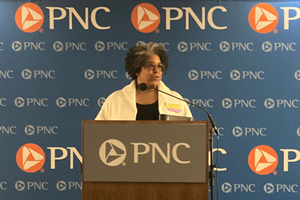Legal Happenings
DC Bar Foundation Celebrates Impactful Collaborations at Fall Reception
November 17, 2023
Bringing together the District’s access to justice advocates for its annual fall reception, the DC Bar Foundation highlighted its accomplishments over the past year, many of which aim to increase collaboration and communication between legal and social services providers.
highlighted its accomplishments over the past year, many of which aim to increase collaboration and communication between legal and social services providers.
The foundation funds civil legal aid through its three grant programs: Access to Justice, Civil Legal Counsel Projects, and General Support to keep families in their homes, protect people in the marketplace and workplace, and amplify the voices of those in need.
In her introductory remarks, DC Bar Foundation CEO Kirra L. Jarratt called attention to two successful initiatives: the DC Legal Aid Transformations Network and efforts to establish a coordinated intake and referral system.
The DC Legal Aid Transformations Network comprises more than 100 members that, over the past year, have been doing “real solid work in uniting the legal services and social services communities in ways that I understand have not been done before,” Jarratt said.
Jarratt also announced that the foundation plans to launch the intake and referral system in March, with the program going into effect in full before the end of 2024.
“This has been a conversation for decades within the community, and it’s going to happen,” she said, acknowledging the Neighborhood Legal Services Program for volunteering to host the pilot program.
Another highlight at the reception was the presentation of the Jerrold Scoutt Prize to Tracy Goodman of Children’s Law Center for her significant contributions to underserved persons in the District of Columbia.
Initially focused on special education advocacy, Children’s Law Center has expanded its work to include representation in matters such as housing, public benefits, and health care access. Goodman directs the center’s Healthy Together medical-legal partnerships program, a holistic approach to addressing the needs of the District’s underserved population.
“In doing this work, you see how interconnected all these legal, medical, and social issues are with one another,” Goodman said. “Accessible walkways and housing are tied to a child’s access to education. A child being able to go to school and learn and grow and feel safe means that Mom or Dad can get or keep their jobs. Mold in homes can seriously impact a child’s health … all of it is tied to basic fairness and access to justice.”
“The first mom I worked with at Children’s Law Center was trying to get her son, who was in a wheelchair, onto his school bus,” Goodman recalled. “But there was no ramp and only a muddy trail between their house and the sidewalk. Following our advocacy, a walkway was built outside the home, and the young boy could get to his bus and his school. The relief and happiness that his mom felt made it clear how much this work matters … that our direct, hands-on support for our neighbors is meaningful and can be life-changing.”


